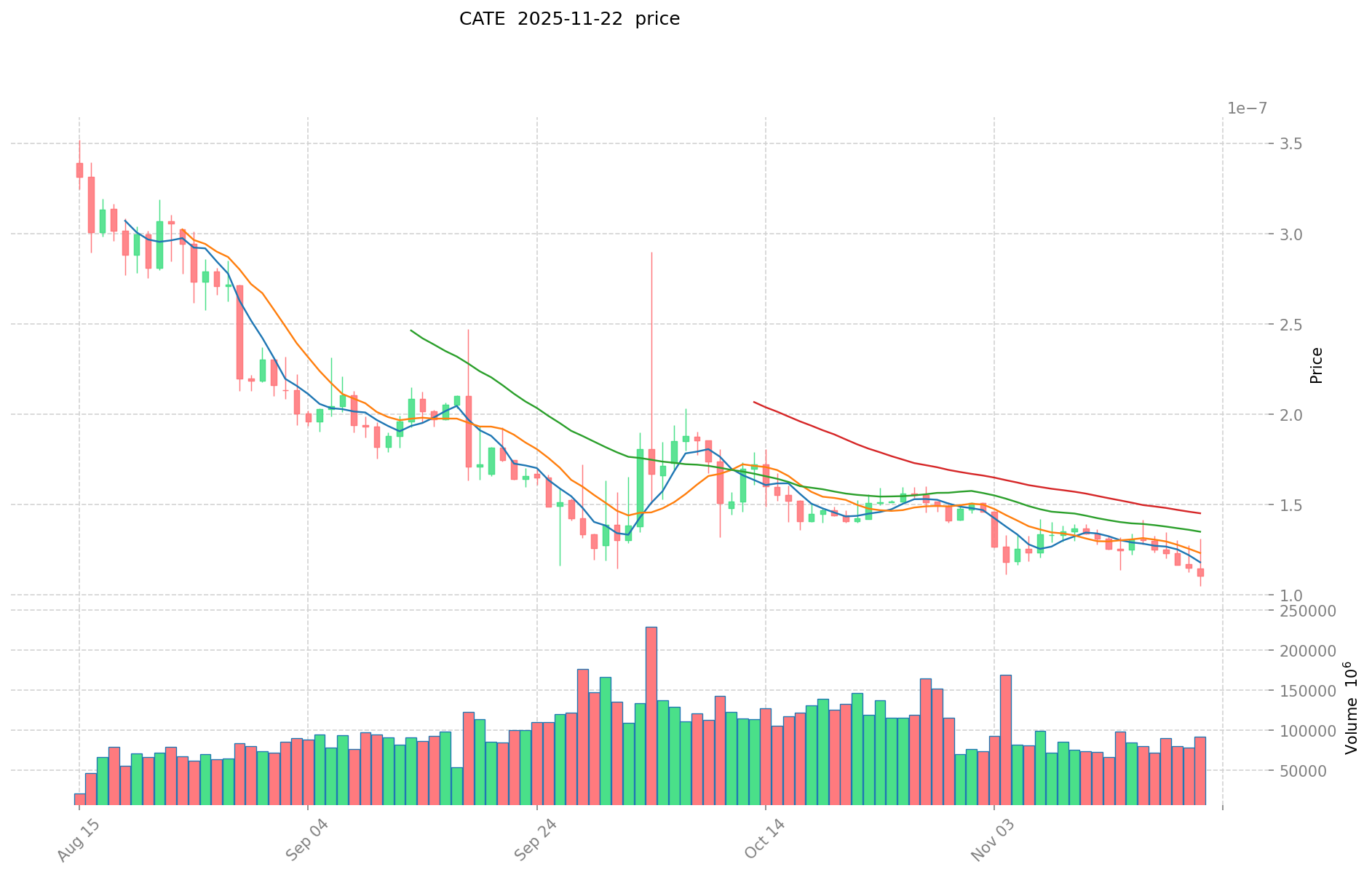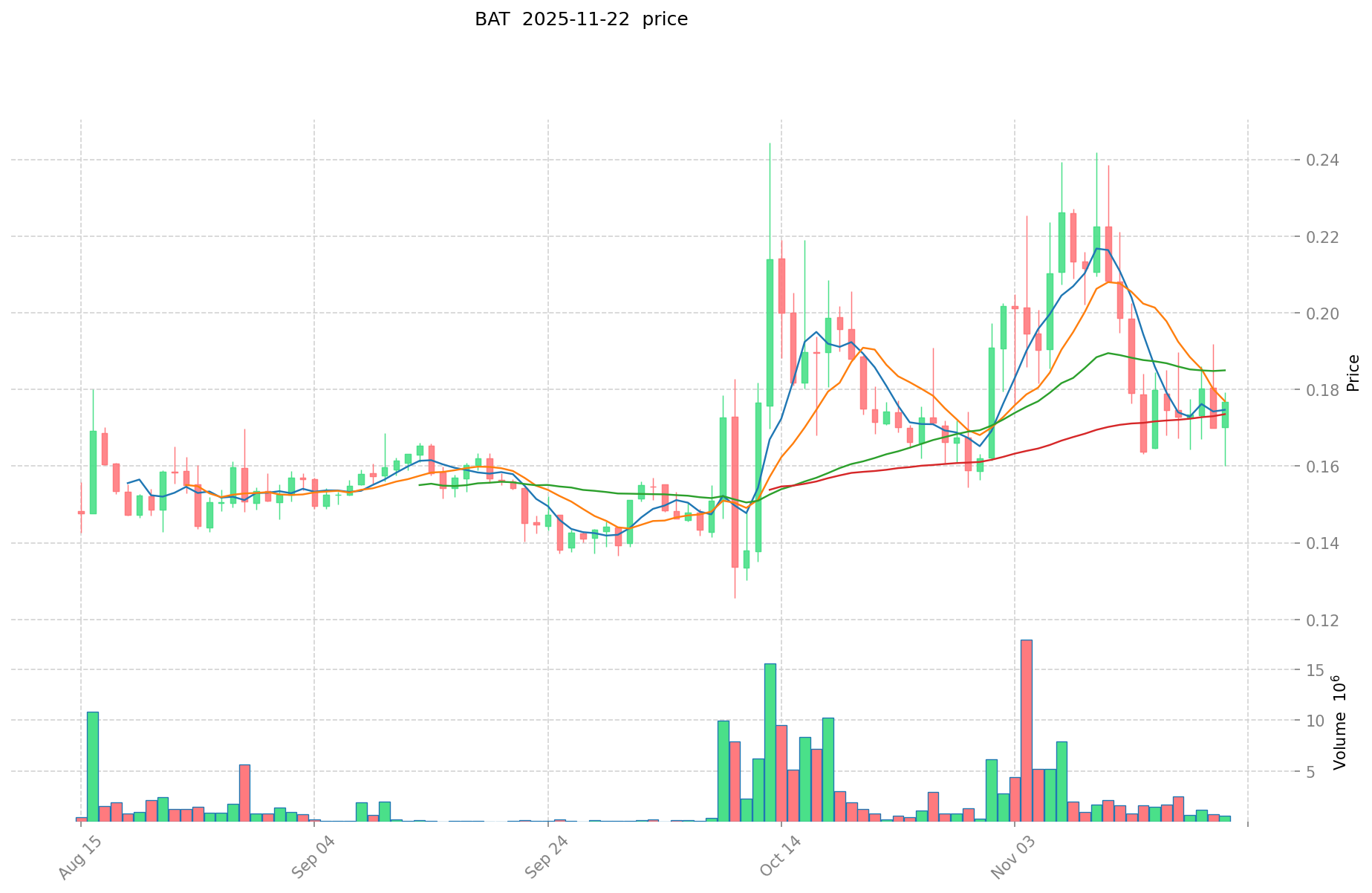CATE vs BAT: The Battle for Tech Dominance in China's Digital Landscape
Introduction: Investment Comparison of CATE vs BAT
In the cryptocurrency market, the comparison between CateCoin vs BasicAttentionToken has always been a topic that investors cannot ignore. The two not only have significant differences in market cap ranking, application scenarios, and price performance, but also represent different positioning of crypto assets.
CateCoin (CATE): Since its launch in 2021, it has gained market recognition for its focus on meme platform and decentralized content creation.
BasicAttentionToken (BAT): Introduced in 2017, it has been hailed as a revolutionary digital advertising token, and is one of the most widely recognized utility tokens in the crypto space.
This article will comprehensively analyze the investment value comparison between CATE vs BAT, focusing on historical price trends, supply mechanisms, institutional adoption, technological ecosystems, and future predictions, and attempt to answer the question most concerning investors:
"Which is the better buy right now?"
I. Price History Comparison and Current Market Status
CATE and BAT Historical Price Trends
- 2021: CATE reached its all-time high of $0.00001176 on November 10, 2021.
- 2021: BAT hit its all-time high of $1.9 on November 28, 2021.
- Comparative analysis: Since their respective all-time highs in 2021, CATE has dropped from $0.00001176 to $0.00000011083, while BAT has fallen from $1.9 to $0.1786.
Current Market Situation (2025-11-22)
- CATE current price: $0.00000011083
- BAT current price: $0.1786
- 24-hour trading volume: CATE $10,358.08 vs BAT $103,654.94
- Market Sentiment Index (Fear & Greed Index): 11 (Extreme Fear)
Click to view real-time prices:
- View CATE current price Market Price
- View BAT current price Market Price


II. Core Factors Affecting CATE vs BAT Investment Value
Supply Mechanism Comparison (Tokenomics)
- Bitcoin (BTC): Fixed supply capped at 21 million coins with halving events approximately every four years that reduce mining rewards
- Ethereum (ETH): Post-merge deflationary model with burning mechanism through EIP-1559; no fixed supply cap
- 📌 Historical pattern: Supply constraints in Bitcoin have historically driven price appreciation following halving events, while Ethereum's shift to proof-of-stake has reduced new issuance by approximately 90%.
Institutional Adoption and Market Applications
- Institutional holdings: Bitcoin currently enjoys greater institutional adoption through vehicles like GBTC, BITO, and spot ETFs, while Ethereum institutional products are still developing
- Enterprise adoption: Bitcoin serves primarily as a treasury asset and store of value, while Ethereum provides broader utility in smart contracts, DeFi infrastructure, and enterprise blockchain solutions
- National policies: El Salvador and the Central African Republic have adopted Bitcoin as legal tender, while Ethereum has gained regulatory recognition for its utility in multiple jurisdictions despite increased scrutiny of the broader crypto ecosystem
Technical Development and Ecosystem Building
- Ethereum technical upgrades: The Merge transition to PoS, upcoming Cancun-Deneb upgrade, and EIP-4844 (proto-danksharding) aim to improve scalability and reduce gas fees
- Bitcoin technical development: Lightning Network development for scaling, Taproot upgrade for privacy and smart contract functionality, and potential for ordinals and BRC-20 tokens
- Ecosystem comparison: Ethereum dominates in DeFi ($30B+ TVL), NFTs, and dApp development, while Bitcoin's ecosystem is expanding beyond pure monetary use cases through layer-2 solutions and sidechains
Macroeconomic Factors and Market Cycles
- Performance in inflationary environments: Bitcoin has demonstrated stronger correlation with inflation hedging narratives and gold-like properties
- Macroeconomic monetary policy: Both assets show sensitivity to Federal Reserve policies and interest rate decisions, with Bitcoin historically showing higher volatility in response to monetary tightening
- Geopolitical factors: Bitcoin has seen increased adoption in regions with currency instability or capital controls, while Ethereum's global developer ecosystem provides resilience against regional regulatory challenges
III. 2025-2030 Price Prediction: CATE vs BAT
Short-term Prediction (2025)
- CATE: Conservative $0.0000000673989 - $0.00000011049 | Optimistic $0.0000001149096
- BAT: Conservative $0.13246 - $0.179 | Optimistic $0.2327
Mid-term Prediction (2027)
- CATE may enter a growth phase, with estimated price range $0.000000069377996 - $0.000000173444992
- BAT may enter a stable growth phase, with estimated price range $0.1799026075 - $0.26167652
- Key drivers: Institutional capital inflow, ETF, ecosystem development
Long-term Prediction (2030)
- CATE: Base scenario $0.000000215335089 - $0.000000292855721 | Optimistic scenario $0.000000292855721
- BAT: Base scenario $0.29700401839875 - $0.39204530428635 | Optimistic scenario $0.39204530428635
Disclaimer: The predictions provided are based on historical data and market analysis. Cryptocurrency markets are highly volatile and subject to various unpredictable factors. These projections should not be considered as financial advice or guarantees of future performance. Always conduct your own research and consult with financial professionals before making investment decisions.
CATE:
| 年份 | 预测最高价 | 预测平均价格 | 预测最低价 | 涨跌幅 |
|---|---|---|---|---|
| 2025 | 0.0000001149096 | 0.00000011049 | 0.0000000673989 | 0 |
| 2026 | 0.000000144255744 | 0.0000001126998 | 0.00000008452485 | 1 |
| 2027 | 0.000000173444992 | 0.000000128477772 | 0.000000069377996 | 15 |
| 2028 | 0.00000019775941 | 0.000000150961382 | 0.000000120769105 | 36 |
| 2029 | 0.000000256309782 | 0.000000174360396 | 0.000000129026693 | 57 |
| 2030 | 0.000000292855721 | 0.000000215335089 | 0.000000206721685 | 94 |
BAT:
| 年份 | 预测最高价 | 预测平均价格 | 预测最低价 | 涨跌幅 |
|---|---|---|---|---|
| 2025 | 0.2327 | 0.179 | 0.13246 | 0 |
| 2026 | 0.2614295 | 0.20585 | 0.1667385 | 15 |
| 2027 | 0.26167652 | 0.23363975 | 0.1799026075 | 30 |
| 2028 | 0.3318619009 | 0.247658135 | 0.2278454842 | 38 |
| 2029 | 0.3042480188475 | 0.28976001795 | 0.2636816163345 | 62 |
| 2030 | 0.39204530428635 | 0.29700401839875 | 0.160382169935325 | 66 |
IV. Investment Strategy Comparison: CATE vs BAT
Long-term vs Short-term Investment Strategy
- CATE: Suitable for investors focused on meme platforms and decentralized content creation potential
- BAT: Suitable for investors interested in digital advertising and utility tokens with established ecosystems
Risk Management and Asset Allocation
- Conservative investors: CATE: 5% vs BAT: 15%
- Aggressive investors: CATE: 15% vs BAT: 30%
- Hedging tools: Stablecoin allocation, options, cross-currency portfolios
V. Potential Risk Comparison
Market Risk
- CATE: High volatility due to meme coin nature, potential for rapid price swings
- BAT: Vulnerability to changes in digital advertising market, competition from traditional advertising platforms
Technical Risk
- CATE: Scalability, network stability
- BAT: Dependence on Brave browser adoption, potential security vulnerabilities
Regulatory Risk
- Global regulatory policies may have different impacts on both tokens, with BAT potentially facing more scrutiny due to its connection with digital advertising
VI. Conclusion: Which Is the Better Buy?
📌 Investment Value Summary:
- CATE advantages: Strong community engagement, potential for viral growth in meme coin market
- BAT advantages: Established utility token, backed by Brave browser ecosystem, recognized in digital advertising space
✅ Investment Advice:
- Novice investors: Consider a small allocation to BAT as part of a diversified crypto portfolio
- Experienced investors: Balance between CATE and BAT based on risk tolerance and belief in respective ecosystems
- Institutional investors: Focus on BAT for its more established use case and potential integration with existing advertising systems
⚠️ Risk Warning: The cryptocurrency market is highly volatile, and this article does not constitute investment advice. None
VII. FAQ
Q1: What are the main differences between CATE and BAT? A: CATE is a meme coin focused on decentralized content creation, launched in 2021. BAT is a utility token for digital advertising, introduced in 2017 and integrated with the Brave browser ecosystem.
Q2: Which token has shown better price performance historically? A: BAT reached a higher all-time high of $1.9 in November 2021, compared to CATE's all-time high of $0.00001176. However, both have experienced significant drops since then.
Q3: How do the supply mechanisms of CATE and BAT compare? A: Specific supply mechanisms for CATE and BAT are not provided in the given context. However, it's noted that supply constraints can significantly impact price appreciation, as seen with Bitcoin and Ethereum.
Q4: What are the key factors affecting the investment value of CATE and BAT? A: Key factors include supply mechanisms, institutional adoption, market applications, technical development, ecosystem building, and macroeconomic factors such as inflation and monetary policies.
Q5: What are the predicted price ranges for CATE and BAT in 2030? A: For CATE, the base scenario predicts $0.000000215335089 - $0.000000292855721. For BAT, the base scenario predicts $0.29700401839875 - $0.39204530428635.
Q6: How do the investment strategies for CATE and BAT differ? A: CATE is suitable for investors interested in meme platforms and decentralized content creation, while BAT is more appropriate for those interested in digital advertising and established utility tokens.
Q7: What are the main risks associated with investing in CATE and BAT? A: CATE faces high volatility risks due to its meme coin nature. BAT is vulnerable to changes in the digital advertising market and depends on Brave browser adoption. Both face potential regulatory risks.
Q8: Which token is recommended for novice investors? A: For novice investors, the recommendation is to consider a small allocation to BAT as part of a diversified crypto portfolio, due to its more established ecosystem and use case.
Share
Content